|
|
|
Sort Order |
|
|
|
Items / Page
|
|
|
|
|
|
|
| Srl | Item |
| 1 |
ID:
019181
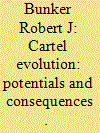

|
|
|
|
|
| Publication |
Summer 1998.
|
| Description |
55-74
|
|
|
|
|
|
|
|
|
|
|
|
|
|
|
|
| 2 |
ID:
056539
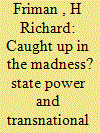

|
|
|
| 3 |
ID:
019183
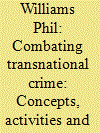

|
|
|
|
|
| Publication |
Autumn/Winter 1998.
|
| Description |
1-362
|
|
|
|
|
|
|
|
|
|
|
|
|
|
|
|
| 4 |
ID:
128788
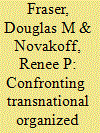

|
|
|
| 5 |
ID:
117961
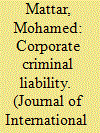

|
|
|
|
|
| Publication |
2012.
|
| Summary/Abstract |
The UN Convention against Transnational Organized Crime (UNCTOC) establishes criminal liability of the corporation as a legal entity in addition to the individual liability of persons who may be acting on behalf of the corporation. The purpose of this article is to address corporate criminal liability for illicit business practices that may be committed by a corporation in violation of international human rights law. This article will discuss corporate criminal liability under international conventional law and will discuss the extent to which U.S. domestic laws recognize corporate criminal liability. The article will highlight new trends in international law related to corporate liability, as well as instances where the legitimacy of corporate liability has been legally denied. Using Article 10 and domestic precedent, this article will argue that the role corporations play in international trade and development warrants their accountability and responsibility once they are involved in illicit business practices.
|
|
|
|
|
|
|
|
|
|
|
|
|
|
|
|
| 6 |
ID:
093831
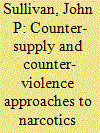

|
|
|
|
|
| Publication |
2010.
|
| Summary/Abstract |
Narcotics and the drug trade contribute to a range of social ills. Among these are social instability, violence, corruption, and a weakening of the state. A range of criminal enterprises, including transnational gangs and drug cartels are engaged in the global trade in illicit drugs. This essay looks at measures to stem this trade through interventions directed against the drug supply and efforts to limit the violence that results from the drug trade. As such it looks at 'counter-supply' and 'counter-violence' approaches. While it emphasizes the impact on the Western Hemisphere - the United States and Latin America - it has international implications for global and national security, intelligence, and law enforcement.
|
|
|
|
|
|
|
|
|
|
|
|
|
|
|
|
| 7 |
ID:
117964
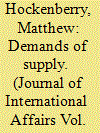

|
|
|
|
|
| Publication |
2012.
|
| Summary/Abstract |
Global trade can give rise to new economic possibilities in developing regions and open a boundless world of opportunity for design and production. The above map shows the supply chains behind electronics manufacture. Constructed by bringing together the routes of consumer electronics products at different stages of assembly, this map provides an overview of the network traveled in global manufacture. As production has become increasingly complex, actors have emerged to take advantage of friction inherent in supply lines. Each point and pathway shown on the map is a site for the potential proliferation of transnational conflict. The products we consume traverse convoluted
pathways of production; pathways put at risk by questionable practices that bring profits at the expense of working conditions, regional stability, and the environment. As seen in this supply chain, the smooth shells that characterize electronic objects can also be cracked by the jagged realities entailed in their construction.
|
|
|
|
|
|
|
|
|
|
|
|
|
|
|
|
| 8 |
ID:
134441
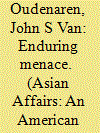

|
|
|
|
|
| Summary/Abstract |
Since the 1980s, Hong Kong triad societies have evolved from hierarchical, pyramidal organizations to loose, compartmentalized syndicates that retain a modicum of hierarchy. Changes in triad organization and modus operandi occurred in response to stringent anti-organized crime measures enacted in Hong Kong. However, organizational evolution has facilitated triad transplantation to China and improved triads’ ability to engage in transnational crime. Triads have exploited favorable circumstances in China: prevalent corruption, rapid urbanization, and high demand for illicit goods and services. This paper includes two case studies of the Sun Yee On triad. The first examines Sun Yee On's localized activity by tracing the evolution of one Shenzhen area chapter. The second case study examines Sun Yee On's role as a supplier of methamphetamine precursor chemicals to Mexico's Sinaloa cartel. Sun Yee On exemplifies how modern triads have become hybridized, assuming attributes of both local Chinese organized crime and transnational criminal networks.
|
|
|
|
|
|
|
|
|
|
|
|
|
|
|
|
| 9 |
ID:
117965
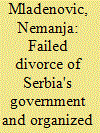

|
|
|
|
|
| Publication |
2012.
|
| Summary/Abstract |
This is how Milos Vasic ended his excellent book Atentat na Zorana in 2005, two years before the Special Court for The first democratically elected Prime Minister of Serbia, Dr. Zoran Djindjic, was assassinated in 2003 by an organized crime group closely connected to Serbian state institutions. The group had amassed enormous wealth through transnational drug trafficking. The political sponsors of Djindjic's assassination are still protected in Serbia today due to the high level of systemic corruption and a lack of political will to prosecute those responsible for this heinous crime. Since their protection impedes justice and, thus, obstructs the rule of law and democratic progress in Serbia, contemporary Serbian society could be seen as the hostage of transnational organized crime and corrupted state officials.
|
|
|
|
|
|
|
|
|
|
|
|
|
|
|
|
| 10 |
ID:
117960
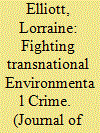

|
|
|
|
|
| Publication |
2012.
|
| Summary/Abstract |
Transnational environmental crime (TEC) is often not taken seriously within the broader policy and enforcement community. It is one of the fastest growing areas of cross-border criminal enterprise involving high profits and low risk for those involved in timber trafficking, wildlife smuggling, the black market in ozone-depleting substances, and the illegal trade in hazardous and toxic waste. TEC is increasingly characterized by commodity-specific smuggling networks, the intrusion of criminal groups involved in other forms of illegal trade and, in some cases, politically motivated organizations for whom this generates income to support other activities. But unlike other forms of transnational crime, there is no international treaty to prevent, suppress, and punish the kinds of trafficking and smuggling that constitute transnational environmental crime. The global regulatory and enforcement community has therefore developed innovative collaborative mechanisms to meet both the criminal and environmental challenges associated with this increasingly serious form of cross-border crime. Despite their successes, their efforts remain under-resourced. This article examines the challenges of TEC and efforts to respond to those challenges in the face of uncertain resources and limited awareness.
|
|
|
|
|
|
|
|
|
|
|
|
|
|
|
|
| 11 |
ID:
117962
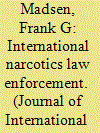

|
|
|
|
|
| Publication |
2012.
|
| Summary/Abstract |
This year sees the celebration of the first century of international legal provisions against the illicit production and trade of narcotics substances. Accordingly, this is an appropriate moment to evaluate the results obtained. The following essay considers how the international prohibition regime created the crime of drug trafficking. The ensuing function of denied demand is the inescapable basis for the development of organized crime. Second, costs of the regime are critically assessed. The former include institutional costs of law enforcement and of the incarceration of individuals sentenced for drug trafficking and related offences, e.g., violence and financial crimes. The indirect costs are difficult to gauge and impossible to monetize. They include the immense suffering caused by drug trafficking as well as the deterioration of public services due to corruption. The present situation on both sides of the U.S.-Mexico border is sufficiently eloquent evidence. Also, narcotics legislation leads to racial tension since the incarceration rates for non-whites for these offences is considerably higher than for whites in the United State and the United Kingdom. Third, political premises are briefly analyzed, namely the implementation of narcotics liaison offices in foreign jurisdictions and the linking of foreign aid and trade privileges to a certification of trade partners' adherence to U.S. antinarcotic drugs law enforcement. One might claim, somewhat counterintuitively, that decriminalization of drug trafficking is not necessary. Drug trafficking has already been decriminalized de facto, if not de jure, by the sheer, constant saturation of the market place.
|
|
|
|
|
|
|
|
|
|
|
|
|
|
|
|
| 12 |
ID:
117963
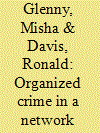

|
|
|
|
|
| Publication |
2012.
|
| Summary/Abstract |
The very benefits of the Internet make it susceptible to being used against individuals, organizations, and states. The changing role of organized crime in a networked society demands understanding the risks involved when using new technologies. Misha Glenny, author of McMafia: Journey through the Global Criminal Underworld, explores the transitions and rapid expansion of what he calls the "global shadow economy," which today accounts for approximately 15 to 20 percent of the world's GDP.[i] According to Glenny, the great danger of cybercrime is the high risk of potentially affecting a large part of the world that is linked to the web and that finds significant value in its interconnectedness. In this interview, conducted by Ronald Davis of the Journal, Misha Glenny exposes the inherent problems associated with the nature of the Internet with respect to organized crime.
|
|
|
|
|
|
|
|
|
|
|
|
|
|
|
|
| 13 |
ID:
159296
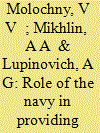

|
|
|
|
|
| Summary/Abstract |
This paper covers issues of security in pirate-threatened parts of the World Ocean. The authors highlight the relationships between terrorist organizations and sea pirates in unstable areas of the world, accentuating the serious danger posed by sea piracy as a global challenge of the 21st century and the role of the RF Armed Forces on the whole and the RF Navy in particular in rendering safer merchant shipping in pirate-infested parts of the Ocean and other areas of intense navigation.
|
|
|
|
|
|
|
|
|
|
|
|
|
|
|
|
| 14 |
ID:
188387
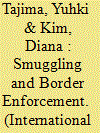

|
|
|
|
|
| Summary/Abstract |
This article analyzes the efficacy of border enforcement against smuggling. We argue that walls, fences, patrols, and other efforts to secure porous borders can reduce smuggling, but only in the absence of collusion between smugglers and state agents at official border crossings. When such corruption occurs, border enforcement merely diverts smuggling flows without reducing their overall volume. We also identify the conditions under which corruption occurs and characterize border enforcement as a sorting mechanism that allows high-skilled smugglers to forge alternative border-crossing routes while deterring low-skilled smugglers or driving them to bribe local border agents. Combining a formal model and an archival case study of opium smuggling in Southeast Asia, we demonstrate that border enforcement has conditional effects on the routes and volumes of smuggling, depending on the nature of interactions between smugglers and border agents. By drawing attention to the technological and organizational aspects of smuggling, this article brings scholarship on criminal governance into the study of international relations, and contributes to debates on the effects of border enforcement and border politics more generally.
|
|
|
|
|
|
|
|
|
|
|
|
|
|
|
|
| 15 |
ID:
117957
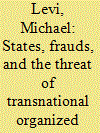

|
|
|
|
|
| Publication |
2012.
|
| Summary/Abstract |
Fraud and corruption are very serious threats to some states and are harmful to all; however, this threat is seldom connected to transnational organized crime (TOC). We cannot examine social problems in a vacuum; we have to construct images of threats through the lens of the social and political threats posed by different aspects of crime and its organization. Harm and threat are not just about their economic cost, but also about how different phenomena hurt our confidence that we can control our surroundings and our future expectations. This anxiety can affect entities such as nation states or even trans-state entities such as "Ummah Wahidah"-the Islamic global community. The aim of this article is threefold: to disentangle the real and imagined threats of fraud, detail the involvement of transnational organized crime groups in fraud, and determine who or what can be reasonably described as threatened by these phenomena. This article rejects the implicit binary view that states are either threatened or not threatened, referring rather to a scale of threat to both states and different sectors within the state. This article critiques the value of Moisés Naím's concept of 'mafia state' to explaining and understanding fraud.
|
|
|
|
|
|
|
|
|
|
|
|
|
|
|
|
| 16 |
ID:
112615
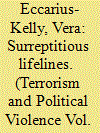

|
|
|
|
|
| Publication |
2012.
|
| Summary/Abstract |
The Armed Revolutionary Forces of Columbia (FARC) and Kurdistan Workers Party (PKK) have both demonstrated an uncanny ability to transform themselves and adapt to changing environmental conditions. Integral to the groups are webbed criminal enterprises, cross-border sanctuaries, and internationally-oriented advocacy networks. Both organizations avoided catastrophic breakdowns through a combination of organic survival mechanisms and precise organizational restructuring. Since 2008, the FARC moved away from a centralized wheel structure model toward a system of multiple decision-making nodes. Guerrilla units now operate in an atomized manner since they are often disconnected from the central leadership. This encouraged a growing number of FARC commanders to focus on narco-profits rather than the organization's ideological goals. Meanwhile, the PKK functions in an octopus-like manner, extending its tentacles into neighboring countries and Europe. However, the process of democratization in Turkey and improved international law enforcement collaboration increased internal as well as external pressure on the PKK to restructure. As a result the PKK is struggling to keep its far-reaching tentacles coordinated. The PKK misjudged its ability to manage political groups which weakened its ideological grip, yet the organization's control over criminal and guerrilla branches continues to be as fierce as ever. The FARC's and the PKK's organizational changes suggest that security agencies in Colombia and Turkey need to adapt their counterterrorism strategies also.
|
|
|
|
|
|
|
|
|
|
|
|
|
|
|
|
| 17 |
ID:
117955
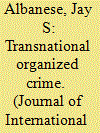

|
|
|
|
|
| Publication |
2012.
|
| Summary/Abstract |
Over the last twenty years, traditional depictions of organized crime as an ethnic, neighborhood phenomenon have given way to discoveries of emerging transnational criminal enterprises involving trafficking, fraud, and corruption on an international scale. The available evidence suggests that these are not two distinct types of criminal conduct. Instead they are overlapping in nature in terms of the crimes committed, the offenders involved, and in how criminal opportunities are exploited for profit. This article analyzes the similarities and differences between organized crime and transnational crime, concluding that they are in fact manifestations of the same underlying conduct and the same pool of criminal offenders. They involve exploitation of similar criminal opportunities, which have changed in form over time. Recommendations for more effective international prevention and responses are made in the context of assessing the remarkable transnational organized crime control efforts of the last decade.
|
|
|
|
|
|
|
|
|
|
|
|
|
|
|
|
| 18 |
ID:
079891
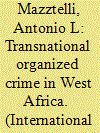

|
|
|
|
|
| Publication |
2007.
|
| Summary/Abstract |
Despite its vast natural and human resources and the undisputed progress made in the last decade towards the establishment of democratic culture and governing systems, West African countries continue to occupy the bottom ranks of the UN Human Development Index. Similarly, many of them score poorly in World Bank and Transparency International indexes that measure good governance. The international mass media have recently highlighted the role played by the West African region in the transatlantic cocaine trade, as well as in the flow of illegal migrants to Europe. Drugs and migrants are, however, just two of the numerous illicit activities that feed the growth of local and transnational criminal organizations, and the establishing of a culture of quick and easy money that is progressively eroding the foundations of any sustainable and well balanced socio-economic development. The pervasive power of the corruption of criminal organizations, coupled with a general crisis by state actors in the administration of justice and enforcement of the rule of law, contribute towards the progressive diminishing of the credibility of the state as the institution entrusted with the prerogatives of guaranteeing security (of people and investments) and dispensing justice. In this context, the case of Guinea Bissau is probably the clearest example of what West African states may face in the near future if the issues of justice and security are not properly and promptly addressed. If primary responsibilities lie with West African governments and institutions, the international community as a whole should also review its approach to development policies by not only mainstreaming the issues of security and justice in their bilateral and multilateral agendas, but also by making it an essential cornerstone of policies and programmes aimed at supporting good governance and the establishment of states ruled by the law.
|
|
|
|
|
|
|
|
|
|
|
|
|
|
|
|
| 19 |
ID:
020616
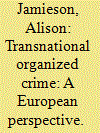

|
|
|
|
|
| Publication |
2001.
|
| Description |
377-387
|
|
|
|
|
|
|
|
|
|
|
|
|
|
|
|
| 20 |
ID:
117959
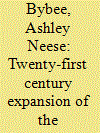

|
|
|
|
|
| Publication |
2012.
|
| Summary/Abstract |
In the last decade, West Africa emerged as a major transit hub for Latin American Drug Trafficking Organizations (DTOs) transporting cocaine to Western Europe. Since that time, there has been cause for hope and despair. The UN Office on Drugs and Crime (UNODC), the Economic Community of West African States (ECOWAS), and an array of international donors have made great strides in acknowledging the growing problem of drug trafficking and have implemented practical measures to stem this flow. All the while, the fears of many observers have been confirmed as the insidious effects of the drug trade have begun to take effect in many West African states. Consumption is on the rise and narco-corruption now undermines the rule of law and legitimate economic growth necessary for development and stability. One of the most alarming trends that place Africa and Africans on the radar of policy makers, law enforcement, and researchers alike is the number of new fronts on which the illicit drug trade is growing. Its geographic expansion beyond the relatively confined region of West Africa is now endangering East and Southern Africa. The arrival of new drugs to the region-heroin and Amphetamine-Type Stimulants (ATS, commonly referred to as synthetic drugs)-has been accompanied by the discovery of local manufacturing facilities to process them. Lastly, the growing level of involvement by Africans-who initially served as facilitators but now appear to be taking a more proactive role-raises concerns that a new generation of African DTOs is rising in the ranks. This paper examines how each of these trends are contributing to the twenty-first century expansion of the drug trade in Africa and summarizes some of the impacts they are having on the states and their populations.
|
|
|
|
|
|
|
|
|
|
|
|
|
|
|
|
|
|
|
|
|